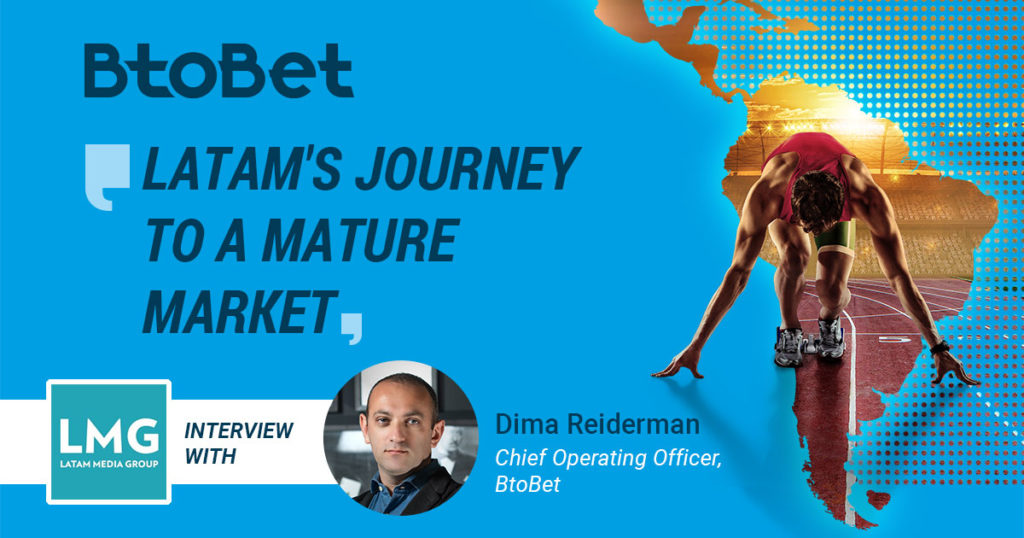LatAm’s Journey To a Mature Market
BtoBet’s COO Dima Reiderman in a recent interview with Latam Media Group spoke about the immense growth the LatAm region had over the last couple of years, highlighting the region’s potential to enhance this growth even further in the years soon to come.
Latin America has perennially been labelled as a market of high potential for online operators. With a population exceeding 600 million people, a huge passion for sports, and where ease of access has increased with channels such as computers, tablets, consoles, or mobiles compatible with these systems, the region could well position itself as one of the most appealing on a global front. And even if up until now only a few countries have legalised and regulated the online sector, the market is experiencing solid growth. And it is this factor, especially when taking in consideration the economic toll that the pandemic has had on LatAm as a whole, that has put in motion a tangible shift towards regularisation, with those countries that have not yet taken the step expected to do so in the coming years.
The lack of regulation on a regional level, not only highlights the actual state of the market’s immaturity, but has resulted in a significant number of offshore operators to offer their products online in those countries lacking a strong regulatory framework. The landscape is set to evolve once a widespread regulatory shift kicks in, with these operators having to adhere to frameworks and process the corresponding license.
Notwithstanding, whilst a lot of work still needs to be done from a regulatory perspective, and as such there is no reliable quantification of the regional GGR, there is the expectation of the industry facing a 20% year-on-year increase with revenues exceeding the $7 billion mark by the end of this year. A market outlook that has garnered the consent of one of our partners, Lenin Castillo, director of online operations at Logrand Entertainment Group, in a recent interview.
Following in Colombia’s steps
Colombia, the first open licensing European-styled regulatory regime in the region, is the primary example of the industry’s potential and how neighbouring countries can emulate its success. Statistics published by Coljuegos, the country’s gambling regulatory entity, indicate that in 2020 total bets from the internet were in excess of $2.2 billion, which indicates a year-on-year growth of circa 73%. And whilst the pandemic impacted heavily the sportsbook industry, with multiple events and competitions brought to a standstill, sports betting still was the largest contributor with a market share of 85%.
The industry’s contributions to the state coffers were also highly positive, with the government collecting over $100 million in tax contributions from the 3.7 million active accounts in the country. And whilst the numbers themselves are an indication of the path set by the strong regulatory frameworks put in place by the country’s authorities, César Valencia, President of Coljuegos indicated that there is no end to this trend, with the sector reporting total bets of almost $1.4 billion during the first four months of this year, a growth of 54% when compared to the same period of 2020. Furthermore, the Ministry of Finance also predicted that the industry would contribute around 6% to the growth of the country’s economy in 2021.
With this in mind, it is heartening to see the region very much active on the regulatory side, with Brazil’s market set to imminently open for business, and the Chilean government seeking to modernise its gambling laws and adopting a more flexible stance towards the online industry.
Avoiding over-regulation
Having said this, whilst the the region’s overall regulatory status is still in its infancy stage, many stakeholders are appealing local authorities to not follow and adopt the same mistakes of more mature markets, primarily Europe. Thorough planning should be made regarding the holistic development of the region’s iGaming industry, and factors such as the economic impact brought by the pandemic should not result in countries and regulators granting licenses without a deep study and analysis taking place, developing regulations weakened by legal loopholes and rules which are, in the very least, unclear.
Regulations should be about generating a competitive market, player protection, increasing tax collections, having in place strong AML processes, tackling the illegal market, and as a direct result of the latter, increasing the channelization rate of players towards legal operators.
A promising outlook
Everything is pointing highly in favour of the region’s regulatory evolution and the industry’s further growth. The trend indicates a sustained growth of the online channels, especially in the current scenario which has led many players to move from in-person to online modality.
A trend that has led many global betting powerhouses manifesting their interest in expanding their operations into Latin America, which with its mix of different cultures, audiences, and player preferences could well prove the be the key to their long term growth strategies.
Interested to find out more about the LatAm region? Check our LatAm Download Center
